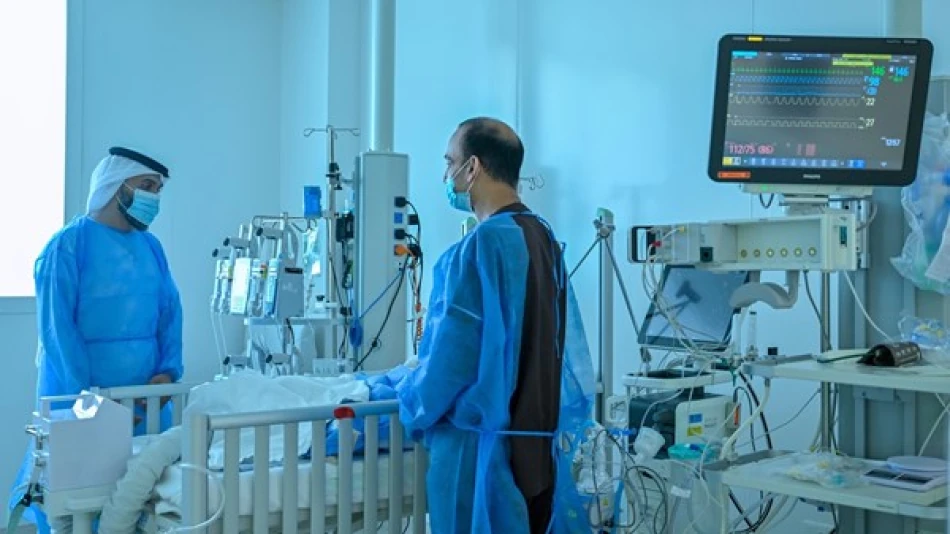
Young Ahmed's Miraculous Recovery: Rare Liver Condition Cured Through Family Donation
UAE Infant Becomes World's Youngest Survivor of Ultra-Rare Genetic Disease After Groundbreaking Liver Transplant
Five-month-old Ahmed Yahya Al Yasi has made medical history as one of fewer than 25 people worldwide to survive an extremely rare genetic disorder, following a successful 12-hour liver transplant performed in Abu Dhabi. The complex procedure, which required precision surgery on blood vessels smaller than matchsticks, represents a breakthrough in pediatric organ transplantation and highlights the UAE's growing capabilities in advanced medical care.
A Race Against Time for the World's Rarest Disease
Ahmed's medical journey began when doctors noticed abnormal liver enzyme levels that rapidly deteriorated. Comprehensive testing revealed he suffered from a congenital glycosylation disorder linked to the ATP6AP1 gene—a condition so rare that global medical literature documents fewer than 25 cases worldwide.
At just under five months old and weighing only 4.4 kilograms, Ahmed became the youngest child in the UAE to undergo liver transplantation. The timing was critical: without intervention, the genetic disorder would have proven fatal, as it disrupts the body's ability to process essential proteins.
Surgical Precision at Microscopic Scale
The April procedure at Burjeel Medical City required extraordinary technical expertise. Dr. Gourab Sen, Director of Burjeel's Multi-Organ Transplant Program, led the operation alongside Dr. Jones Shaji Mathew and a specialized pediatric team.
Technical Challenges
The surgery's complexity stemmed from Ahmed's infant physiology. Surgeons had to carefully reshape a portion of liver donated by the child's aunt-in-law to fit within his narrow abdominal cavity. Each blood vessel connection measured smaller than a matchstick, leaving virtually no margin for error during the 12-hour procedure.
This level of microsurgical precision in pediatric liver transplantation places the UAE alongside leading medical centers in countries like Germany, the United States, and Japan, where similar ultra-complex pediatric procedures are performed.
Regional Medical Hub Ambitions
Ahmed's successful treatment reinforces the UAE's strategy to become a global medical tourism destination and regional healthcare leader. The country has invested heavily in specialized medical infrastructure, attracting international expertise and developing capabilities that previously required patients to seek treatment abroad.
Comparative Context
While pediatric liver transplants are performed globally, cases involving genetic disorders this rare are exceptional. Major medical centers in Singapore, South Korea, and European countries typically handle the world's most complex pediatric cases, making this UAE success particularly significant for the region's medical reputation.
Long-Term Implications and Recovery
Ahmed now requires lifelong medical monitoring under Dr. Kesava Ramakrishnan's pediatric intensive care program. His treatment includes nutritional support, immune system monitoring, and family counseling—a comprehensive approach that reflects modern transplant medicine's understanding that successful outcomes depend on sustained, multidisciplinary care.
The case demonstrates how organ donation can address even the rarest medical conditions. For investors and healthcare planners, it signals the UAE's capacity to handle highly specialized procedures that generate significant medical tourism revenue while serving the local population's complex medical needs.
Broader Medical and Economic Impact
Ahmed's survival contributes valuable data to global research on ATP6AP1-related disorders. With so few documented cases worldwide, each successful treatment provides crucial insights for future patients with similar conditions.
From a healthcare economics perspective, the case showcases the UAE's return on investment in advanced medical infrastructure. Successfully treating ultra-rare conditions domestically reduces medical evacuation costs while positioning the country as a destination for complex pediatric cases from across the Middle East and Africa.
The successful outcome reflects broader trends in Middle Eastern healthcare development, where countries like the UAE and Saudi Arabia are rapidly building world-class medical capabilities to serve both domestic populations and international patients seeking advanced treatments.
Most Viewed News

 Layla Al Mansoori
Layla Al Mansoori






